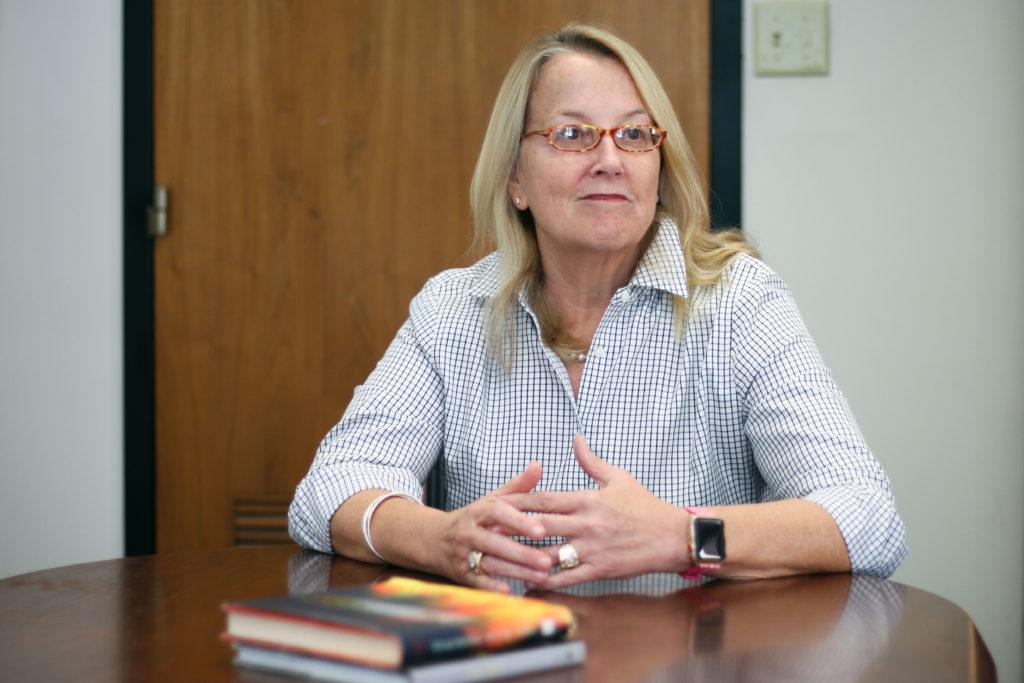In the past year, the Colonial Health Center has seen three different leaders.
First, it was Glenn Egelman, the first permanent director of the CHC after the center opened in 2015. When Egelman abruptly resigned from his post last September after serving just six months in the role, Danielle Lico, the former associate dean of students for administrative services, took the helm of the center – but her position was eliminated during an administrative shuffle this summer.
Now, the center is led by M.L. “Cissy” Petty, the inaugural dean of the student experience, who is overseeing the center while officials search for a new permanent director. Administrators said Petty is the right choice to supervise the center because of her background in counseling and understanding of student affairs.
Petty said that since she arrived on campus, she has spoken to student leaders and officials in the CHC about how health care is integrated into the student experience. She said she has heard students’ concerns about cost, quality, transparency and accessibility for students, and plans to “take a deep dive” into the center’s issues in its mental and physical health units.
“What I want to research and think through with students and the data is what will work best,” she said. “I think the space is fine, it’s great to have two services, maybe it’s that we are trying to push them together too much. Maybe there’s a model we haven’t thought of yet with more counselors.”
Petty said she wants to transition the health center to a “wellness” model, which incorporates physical, mental and spiritual health.
“I see wellness as holistic and focus on the positive aspects of a student’s well-being – both their physical and mental health and their ability to manage stress and be resilient in times of struggle and in times of success and achievement,” Petty said in an email.
Petty added that she will continue to meet with University leaders on a regular basis to discuss how the center could improve “while we determine the best fit for a new central leader.”
The CHC has long been a turbulent office. Three staffers – including the former head of Mental Health Services – were found to be unlicensed to practice in the District in 2015. In recent years, students have also alleged quality issues within the center, and last spring, the former director of the CHC claimed the center was not transparent about billing with students and did not regularly re-evaluate health care methods.
But officials have aimed to address some of the center’s issues in recent months by creating a student health insurance mandate, moving health records to an electronic records-keeping system and increasing the number of free mental health sessions available to students.
Petty added that she plans to meet with the Student Health Advisory Council, a student health care advocacy group, to have “robust conversations” about the CHC – but she didn’t say what the discussions would include. She declined to say how often she will meet with the council.
Noah Wexler, the Student Association’s director for health policy and a member of SHAC, said he hopes to work with Petty to develop surveys to “get a bigger picture” of students’ experiences with the CHC. He said he and the SA director of student health services are meeting with Petty in the coming weeks to discuss improving the quality of service the CHC provides.
“I would appreciate her addressing the information transparency issues that I think the CHC has found,” he said. “The CHC lacks a mechanism for easy information access.”
Last month, Petty said she plans to look into the CHC’s weekend hours and potentially expand them beyond the current 9 a.m. to noon schedule on Saturdays for urgent care only.
Laurie Koehler, the senior vice provost of enrollment and the student experience, said Petty is qualified to take on the role of CHC director because of her counseling background – she served as a postdoctoral fellow in counseling at the University of North Carolina Greensboro from 1996 to 1998, according to her LinkedIn profile. Petty also supervised student health and counseling services at Loyola University New Orleans.
Koehler also said Petty’s position as dean of the student experience makes her fit to oversee the CHC, because health services are an important component of student life.
“We believe health and wellness are critical components to an integrated, holistic approach to a student’s experience,” Koehler said.
Koehler declined to say how leadership turnover has affected staff at the CHC or if it has affected morale or service. But she said the changes in leadership “may require my staff members to adjust to management styles.”
Lico, the center’s former director who departed in July, did not return multiple requests for comment.
Egelman, the center’s first director who resigned last fall, said the person leading the CHC should have knowledge of health care management, health care quality, and safety and integration of health and counseling.
He said it’s not likely that a person with a background in student affairs would have expertise in all those areas – and so when the University hires a permanent director for the CHC, that person should have a background in medicine.
“I think that the person overseeing the unit needs to work with people who have the strengths where they are weak,” he said.
Egelman said that leadership turnover in the CHC could impact staff morale depending on the way staffers react to the change in leadership.
“Two things could happen – the individual units in the center could silo themselves and you get territoriality,” he said. “Or they could work together, learn each others functionality and integrate with each other in a seamless fashion, putting the students first.”




